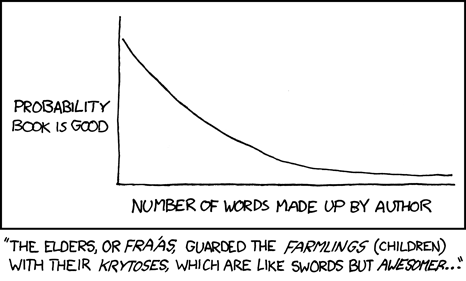Anathem by Neal Stephenson. Amazing.
Anathem is set on and around the planet Arbre. Thousands of years prior to the events in the novel, society was on the verge of collapse. Intellectuals entered concents, much like monastic communities but focused on intellectual endeavors rather than religious practice. Here, the avout— intellectuals living under vows and separated from Sæcular society, fraa (derived from Latin frater) for male avout and suur (derived from Latin soror) for female avout — retain extremely limited access to tools and are banned from possessing or operating most advanced technology (at a level beyond paper and pen) and are watched over by the Inquisition, which answers to the outside world (known as the Sæcular Power). The avout are forbidden to communicate with people outside the walls of the concent except during Apert, a 10-day observance held only once every year, decade, century, or millennium, depending on the frequency with which a given group of avout is allowed to interact with the Sæcular world. Concents are therefore slow to change - unlike the rest of Arbre, which goes through many cycles of booms and busts.
Interaction between the avout and the Sæcular world is not, however, limited to Apert. The secular power may "Evoke", or remove from the concent, members of the avout, when needed to address pressing scientific ("theorical") issues facing Sæculars. Such removal is one of many "Auts" (ritual acts) performed on certain occasions – much like rituals or sacraments of the Roman Catholic Church. The act of removing an avout from a concent at the request of the Sæcular Power is called "Voco" (a Latin word meaning "I call": most of the technical words used in Anathem are derivations or puns on Latin words, cf. Lucub – a late-night study session – from the Latin lucubratio), or "evocation", the avout called being "evoked".
The narrator and protagonist, Erasmas, is a fraa at the Concent of Saunt Edhar (Saunt, abbreviated St., is a corruption of the ancient word savant and is a title bestowed on influential intellectuals of the past).
...
...
Need some ideas for sci fi
24 posts
• Page 2 of 3 • 1, 2, 3
Re: Need some ideas for sci fi
Just watched the movie equilibrium. I'd actually never heard of it before despite starring christian bale. I think its exactly what you're looking for 

-

The Comrade - Vice President
- Posts: 18439
- Joined: Sun Aug 19, 2012 1:10 pm
- Location: Yugoslavia
- Gender:

- Has thanked: 1212 times
- Been thanked: 1889 times
- Political Leaning: Socialist
Re: Need some ideas for sci fi
Ha that movie got overshadowed by the Matrix when it came out. It was the rage back in high school amongst my nerd friends. Good flick. Gunkata is cool.
-

exploited - Vice President
- Posts: 23035
- Joined: Fri Sep 14, 2012 2:32 pm
- Location: Ontario, Canada
- Gender:

- Has thanked: 2562 times
- Been thanked: 1837 times
Re: Need some ideas for sci fi
The Windup Girl.
a little bit preachy
a little bit depressing
but well done and very original
a little bit preachy
a little bit depressing
but well done and very original
-

eynon81 - VIP

- Posts: 19475
- Joined: Mon Aug 20, 2012 10:38 am
- Location: Golden, Colorado
- Gender:

- Has thanked: 3875 times
- Been thanked: 1821 times
- Political Leaning: Very Conservative
Re: Need some ideas for sci fi
The Subversives
-

broken robot - VIP

- Posts: 2017
- Joined: Sat Sep 22, 2012 2:11 pm
- Location: CA
- Gender:

- Has thanked: 206 times
- Been thanked: 235 times
- Political Leaning: Socialist
-

Winchester - Governor
- Posts: 5872
- Joined: Sun Aug 19, 2012 12:07 pm
- Gender:

- Has thanked: 822 times
- Been thanked: 853 times
-

Winchester - Governor
- Posts: 5872
- Joined: Sun Aug 19, 2012 12:07 pm
- Gender:

- Has thanked: 822 times
- Been thanked: 853 times
Re: Need some ideas for sci fi
alot has been mentioned but to reiterate
Battlestar Galatica. not only the best scifi but one of if not the best TV shows in the history of TV shows
Vernor Vinge. Deepness is his best, but Fire in the Sky and Rainbow's End are also amazing.
Orson Scott Card. Obviously Ender, but he had some other interesting series as well.
Alistar Reynolds. This guy used to work for the European Space Agency now he just writes amazing space opera. Revelation Space is the place to start.
Common thread through all of these: almost completely hard sci fi. these things are not fantasy like star trek or star wars. they have concepts like the melding plague, a plague that attacked biomechanical nanorobots, lighthuggers which approach but do not exceed the speed of light, the 'focus' virus which makes you forget bodily functions and keeps you working on whatever task you are focused to, etc etc
oh and exploited... I enjoyed Anathem... but i also enjoyed xkcd's comic on it

Battlestar Galatica. not only the best scifi but one of if not the best TV shows in the history of TV shows
Vernor Vinge. Deepness is his best, but Fire in the Sky and Rainbow's End are also amazing.
Orson Scott Card. Obviously Ender, but he had some other interesting series as well.
Alistar Reynolds. This guy used to work for the European Space Agency now he just writes amazing space opera. Revelation Space is the place to start.
Common thread through all of these: almost completely hard sci fi. these things are not fantasy like star trek or star wars. they have concepts like the melding plague, a plague that attacked biomechanical nanorobots, lighthuggers which approach but do not exceed the speed of light, the 'focus' virus which makes you forget bodily functions and keeps you working on whatever task you are focused to, etc etc
oh and exploited... I enjoyed Anathem... but i also enjoyed xkcd's comic on it

Americans learn only from catastrophe and not from experience. -- Theodore Roosevelt
My life has become a single, ongoing revelation that I haven’t been cynical enough.
My life has become a single, ongoing revelation that I haven’t been cynical enough.
-

John Galt - Technical Admin
- Posts: 14869
- Joined: Sat Aug 18, 2012 3:22 pm
- Location: Bowling Green Massacre Survivor
- Gender:

- Has thanked: 719 times
- Been thanked: 1497 times
- Political Leaning: Classic Liberal
24 posts
• Page 2 of 3 • 1, 2, 3
Who is online
Users browsing this forum: No registered users and 7 guests

